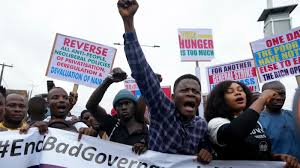The Nigerian Economic Society (NES) has expressed concern over the state of social welfare in the country, describing it as ignominious. The body noted that about 133 million Nigerians currently face multiple deprivations in key areas such as education, health, and living standards.
The President of NES, Professor Adeola Adenikinju, made this known on Tuesday in Abuja during a press briefing ahead of the society’s 66th Annual Conference scheduled to hold next week. He stressed that while Nigeria has recorded some macroeconomic progress, the reality on the ground for millions of citizens remains dire.
Professor Adenikinju said socio-economic development is multi-sectoral and cumulative, explaining that progress cannot be judged by economic growth numbers alone. According to him, Nigeria must pay greater attention to human welfare, social inclusion, and sustainable development.
He noted that recent reforms introduced by the Federal Government have helped to strengthen the economy. “Such policy reforms have produced encouraging signals. For instance, official data indicate that headline inflation eased in July 2025 relative to previous months. While this is not a victory lap as inflation in the country remains high relative to comfort – and the gains have not been felt evenly by households – it is nevertheless an indicator of what is possible when well-designed fiscal and monetary policies are implemented. That path must be sustained, broadened, and translated into real economic gains for MSMEs and households,” he stated.
The NES President stressed that policy reforms should directly impact the nearly 40 million micro, small, and medium enterprises (MSMEs) in the country as well as households struggling to survive. He added that unless reforms translate to jobs, affordable living, and reduced poverty, many Nigerians will continue to be left behind.
Professor Adenikinju warned that despite signs of macroeconomic stability, the harsh realities facing millions of Nigerians cannot be ignored. He recalled that the Multidimensional Poverty Index last measured in 2022 showed that 133 million Nigerians live with multiple forms of deprivation. These include poor access to healthcare, low-quality education, and lack of basic living standards.
“At the same time, we cannot ignore the glaring facts about the ignominious state of social welfare. Nigeria’s Multidimensional Poverty Index identified roughly 133 million Nigerians experiencing deprivations across education, health, and living standards,” he said.
According to him, economic growth must be measured not just by Gross Domestic Product (GDP) figures but by citizens’ dignity and quality of life. He explained that when millions of people live in poverty, it undermines the sustainability of national growth.
“Socio-economic development depends on healthcare that is reliable and affordable, educational systems that build human capital, secure communities, and functioning food systems. Hence, social inclusion is not optional. When 133 million Nigerians face multiple deprivations, growth must be measured not only by GDP but by dignity, opportunity, and access to basic services,” Adenikinju added.
He further stressed that building human capital is central to lifting people out of poverty. He urged government at all levels to prioritise policies that improve education, expand healthcare access, support food security, and create opportunities for young people.
Observers say the remarks from NES come at a time when many households are battling high living costs, weak purchasing power, and joblessness. Although inflation is said to have eased slightly, prices of essential goods and services remain high across the country.
Analysts also agree that Nigeria’s overdependence on oil revenues and limited investment in human capital have made it difficult for economic growth to translate into social welfare. They argue that unless bold policies are implemented, poverty reduction will remain slow, and inequality will continue to widen.
The forthcoming NES Annual Conference is expected to focus on policies that can balance economic growth with social inclusion. Stakeholders in government, academia, civil society, and the private sector are expected to attend the event to deliberate on strategies for addressing poverty and inequality.
For now, the society’s warning reflects a growing concern that millions of Nigerians are still left behind despite signs of economic recovery. Experts believe that meaningful reforms must go beyond figures and focus on the lives of ordinary citizens.
